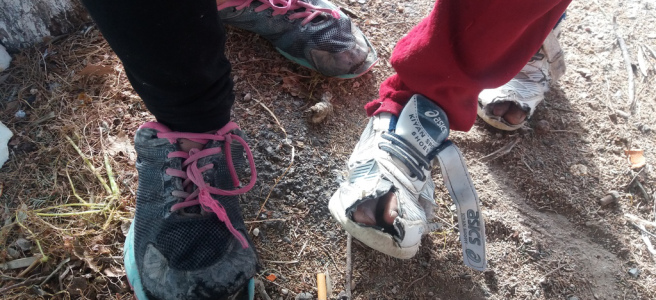“We ask UNHCR about the law, about what we’re going to do, and how long we’re going to wait. They just tell us to keep waiting.”
“What services will I receive in Vial?” My translator paused as she scanned ahead in the text.
“You will have access to medical help, dry clothes if yours are wet and shelter while waiting for registration. There is a child-friendly space with facilities for baby changing and for breastfeeding.”
We look around us, and then at one another.
Standing amongst lines of cabins in the Vial Registration Centre on the island of Chios in Greece, it was hard to see where the writer had found his information. The leaflet I held was intended for distribution to the island’s new arrivals, but it wasn’t yet available in Farsi, or any dialects of Kurdish.
Vial refugee camp was formerly a recycling warehouse, and before that an aluminium factory. It is dominated by a large concrete hall, flanked either side by cabins enclosed by a high wire fence. Against the fence, waste water pools around broken pipes, dull green but for the bright interruption of a discarded child’s jumper.
Young refugees stand nearby, some wearing makeshift trousers and dresses fashioned from discarded blankets.
As we entered the hall, families lay sleeping together on cold concrete. Child-friendly spaces were conspicuous by their absence.
In May UK Prime Minister David Cameron dangled the prospect of a partial climbdown by his Government over the Dubs Amendment, which will see a number of lone Syrian child refugees from across Europe given asylum in the UK. A report published this week by the European Commission warns that business for human traffickers is booming, with the issue of child trafficking having “been exacerbated by the ongoing migration crisis”.
At the same time, incidents at this makeshift detention centre at the other end of the continent show just how easily unaccompanied minors arriving on EU shores can slip out of sight of the agencies charged with their protection.
Over two nights in early May at least six young boys left Vial and attempted to smuggle themselves to Athens. Of these, three were seen in the vicinity of the port by members of CESRT, a locally-run volunteer group.
One of the boys wore a bruise on the side of his face, and another was crying.
Abbas Jaffri, 16, has been in Vial since 24 March. He knew the boys, and confirmed that three had reached Athens, with at least one now searching for a smuggler who will take him out of Greece. One volunteer suggested that some of the youngsters “don’t get that they won’t be deported. They’re still afraid of that”. Abbas, however, claims the group acted out of frustration.
“No-one cares about the minors,” he said. “We ask UNHCR about the law, about what we’re going to do, and how long we’re going to wait. They just tell us to keep waiting.”

The condition of clothes and shoes worn by child refugees living in Vial. [Image credit: Mike Freigeist/Color of the World]
Earlier this month the staff of the First Reception Service (FRS), which runs the facility on behalf of the Greek government, are on strike over concerns for their safety, while Frontex, the EU’s border management agency, also withdrew.
UNHCR confirmed that a 14 year old boy resident in Vial was raped in April.
Abbas told me he spent five days in hospital after he and his friends were assaulted there. “During the night there are no police inside Vial,” lamented Shouaib Noori, a former military contractor for the US Army in Kabul.
A spokesperson for Save the Children admitted to “serious concerns about the safety of unaccompanied children on Chios”. Also unable to commit staff to the facility due to “security concerns”, the NGO is only able to estimate the number of lone minors in Vial at 30. A member of Praksis, the UNHCR’s “implementation partner” on the island, admitted that they now have “no idea” of the figure.
The proposed climbdown over the Dubs Amendment undoubtedly offers hope to some of the tens of thousands of child refugees who have arrived in Europe since early 2015. On Chios, however, amidst deteriorating humanitarian conditions, and despite the efforts of NGOs and volunteers on the ground, unaccompanied minors are quietly slipping through the cracks in an overworked system.

